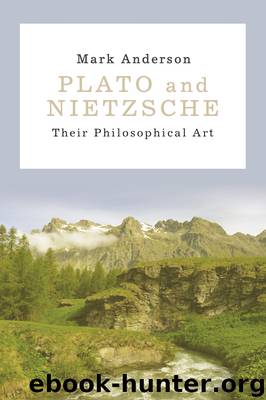Plato and Nietzsche by Anderson Mark;

Author:Anderson, Mark;
Language: eng
Format: epub
Tags: Their Philosophical Art
Publisher: Bloomsbury Publishing
Published: 2014-03-14T16:00:00+00:00
Nietzsche and science
Nietzsche has been a subject of curiosity and controversy in the English-speaking world since early in the twentieth century, and no strand of his thought has inspired more scholarly activity than his ideas about the nature and accessibility of reality and the value and even the very existence of truth. On these topics, as on others, his work has been for many a screen on which to project images of their own ideals and aspirations. The only other philosopher who has been made so often to serve a similar function is Plato, from the intricately woven dramatic context of whose works scholars have long been in the habit of wrenching arguments, which they then interpret and analyze according to their own preferred terminology and intellectual concerns. Thus Plato has been in turns an optimist and a pessimist, an advocate of tyranny and a proponent of democracy, a dreamy metaphysician and a sober linguistic analyst.34 This tendency has begun to decline in recent years as subtle readers have demonstrated the integrity of the dialogues as artistic-literary-philosophical wholes whose individual components cannot be detached without distortion. As for Nietzsche, there is undeniably a degree of unity and consistency among his ideas—and even when he changes his mind we can, generally, track the transformations and discern the rationale behind them—but he organized the contents of his books at times according to so mystifying a plan, and he adopted such a diversity of rhetorical postures, that it never is a simple matter to find the thread through the labyrinth of his argument. This is not to everyone’s taste; but a certain type of reader is drawn to Nietzsche, as he is drawn to Plato, precisely because of the richness, complexity, and occasional ambiguity of his ideas. These same qualities, however, are problematic to the extent that they provide opportunities for the sort of projections I described in connection with Plato.
In 1908, H. L. Mencken published the first book-length treatment of Nietzsche’s ideas in the English language. In the course of the following two decades Mencken became an intellectual force with a national influence unparalleled by any but the rarest of public intellectuals today, and throughout the period of his greatest power he wrote constantly about Nietzsche. Mencken was a social-Darwinist, a rebel against authority (especially as exercised by the masses via democratic and religious institutions), and a passionate advocate of fallibilist science. His Nietzsche is all these things as well. Most relevant to our present concerns, Mencken’s Nietzsche is a truth-seeker who charts his course by the guiding star of science. “It is evident,” Mencken writes in his early study of Nietzsche, “that science … will eventually accomplish with certainty what philosophy … is now trying to do in a manner that is not only crude and unreasonable, but also necessarily unsuccessful.”35 The critique of philosophy may remind one of Nietzsche, but the naive faith in science does not. Mencken acknowledges that Nietzsche’s views on truth are “so abstruse” that he cannot provide “an understandable summary” of them in his book.
Download
This site does not store any files on its server. We only index and link to content provided by other sites. Please contact the content providers to delete copyright contents if any and email us, we'll remove relevant links or contents immediately.
The remains of the day by Kazuo Ishiguro(8338)
Tools of Titans by Timothy Ferriss(7737)
Giovanni's Room by James Baldwin(6749)
The Black Swan by Nassim Nicholas Taleb(6719)
Inner Engineering: A Yogi's Guide to Joy by Sadhguru(6405)
The Way of Zen by Alan W. Watts(6253)
Asking the Right Questions: A Guide to Critical Thinking by M. Neil Browne & Stuart M. Keeley(5319)
The Power of Now: A Guide to Spiritual Enlightenment by Eckhart Tolle(5291)
The Six Wives Of Henry VIII (WOMEN IN HISTORY) by Fraser Antonia(5197)
Astrophysics for People in a Hurry by Neil DeGrasse Tyson(4973)
12 Rules for Life by Jordan B. Peterson(4138)
Housekeeping by Marilynne Robinson(4016)
The Ethical Slut by Janet W. Hardy(4008)
Skin in the Game by Nassim Nicholas Taleb(3941)
Double Down (Diary of a Wimpy Kid Book 11) by Jeff Kinney(3873)
Ikigai by Héctor García & Francesc Miralles(3829)
The Art of Happiness by The Dalai Lama(3817)
Skin in the Game: Hidden Asymmetries in Daily Life by Nassim Nicholas Taleb(3695)
Walking by Henry David Thoreau(3658)
